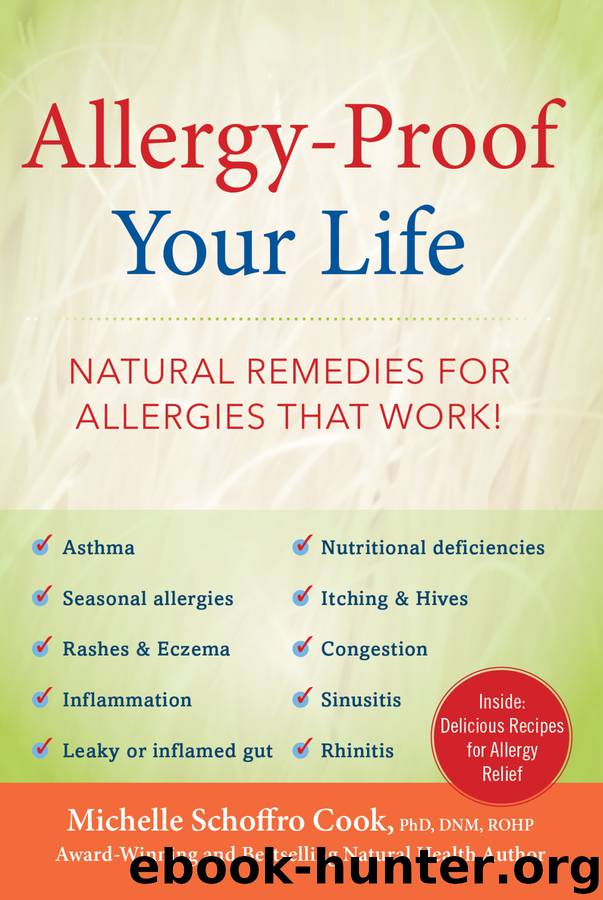Allergy-Proof Your Life by Michelle Schoffro Cook

Author:Michelle Schoffro Cook
Language: eng
Format: epub
Tags: HEA027000 Health & Fitness / Allergies
Publisher: Guggenheim Museum
Vitamin D
Most of us know that vitamin D is important to keep our immune system strong, but few people know that there are many other health benefits of getting enough of the sunshine vitamin. Vitamin D can help improve allergy symptoms, particularly by improving lung function. That’s because a vitamin D deficiency is linked to a rapid decline in lung function, according to research published in the American Journal of Respiratory and Critical Care Medicine.5 The researchers explored the relationship between vitamin D and smoking, lung function, and lung decline in 626 men. We all know that smoking harms lung function, but the researchers found that vitamin D had a protective effect on the lungs and reduced the rate of lung function decline, even among those with the highest risk of respiratory decline—smokers. Although the study focused on smokers because lung changes are easier to observe among these individuals, the lung improvements are sure to apply to nonsmoking allergy sufferers as well.
There are three primary sources of vitamin D: moderate sunlight exposure, food sources, and supplements. Tuna, salmon, and mackerel are the primary food sources of vitamin D, but beef liver and egg yolks also contain some. Because it is difficult to obtain all the vitamin D needed from sunlight or food, supplementation with D3 (also known as cholecalciferol, the type of vitamin D that has been used in most studies showcasing the vitamin’s benefits), I also recommend supplementing with the vitamin to maintain a healthy respiratory system and reduce the impact of allergies. Although some sources suggest 800 IU daily for adults, most people actually need much higher amounts than that. I usually recommend 4000 IU daily for adults. Vitamin D is available in a liquid form that is readily absorbed under the tongue. Be sure to choose vitamin D3, not D2, which is actually a synthetic version of the nutrient.
Download
This site does not store any files on its server. We only index and link to content provided by other sites. Please contact the content providers to delete copyright contents if any and email us, we'll remove relevant links or contents immediately.
Men In Love by Nancy Friday(5232)
Everything Happens for a Reason by Kate Bowler(4729)
The Immortal Life of Henrietta Lacks by Rebecca Skloot(4571)
Why We Sleep by Matthew Walker(4433)
The Sports Rules Book by Human Kinetics(4378)
Not a Diet Book by James Smith(3409)
The Emperor of All Maladies: A Biography of Cancer by Siddhartha Mukherjee(3142)
Sapiens and Homo Deus by Yuval Noah Harari(3061)
Day by Elie Wiesel(2779)
Angels in America by Tony Kushner(2648)
A Burst of Light by Audre Lorde(2597)
Endless Forms Most Beautiful by Sean B. Carroll(2472)
Hashimoto's Protocol by Izabella Wentz PharmD(2371)
Dirty Genes by Ben Lynch(2313)
Reservoir 13 by Jon McGregor(2300)
Wonder by R J Palacio(2203)
And the Band Played On by Randy Shilts(2191)
The Immune System Recovery Plan by Susan Blum(2057)
Stretching to Stay Young by Jessica Matthews(2036)
